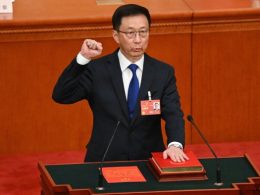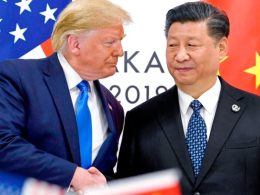Unlock the White House Watch newsletter for free
Your guide to what the 2024 US election means for Washington and the world
The writer is the junior US senator for Connecticut
Economists and pundits have spent the last two weeks frantically trying to decode what President Donald Trump’s ultimate aim is with tariffs. Last week’s spectacular flip-flop, in which he paused the majority of them for 90 days, came after the White House had spent days insisting the tariffs were not up for negotiation but were instead a long-term strategy to help revitalise the US industrial base and bring back jobs. However, there is a simple reason that Trump’s shortlived tariffs make little economic sense: they are not designed as economic policy but as a means to compel loyalty to the president.
When combined with smart domestic industrial policy, tariffs can help to protect American jobs and goods. But these chaotically designed blanket global tariffs are not accomplishing anything other than threatening to send prices skyrocketing and destabilising the global economy. This makes sense because Trump’s goal seems to be to impose economic chaos, requiring the leads of industry to come running to him to plead for relief.
According to reports, Trump has acknowledged that he does not mind if his policies cause a recession, so long as they do not lead to a depression. He must not remember the nearly 9mn jobs lost during the Great Recession of 2008 and the 10mn Americans who lost their homes to foreclosure. But these tariffs were never really about helping working people, bringing jobs back to the US or fixing our broken global trading system. The 90-day pause is proof of that.
How many new manufacturing plants or jobs are being created to justify jeopardising Americans’ retirement plans? Which are the 75 countries Trump is negotiating with? Have they offered terms that would serve American workers and not just special interests? Or are these tariffs just about putting US companies in a chokehold until they surrender?
Take Apple, for example. Commerce secretary Howard Lutnick fantasised about an “army of millions and millions of human beings screwing in little, little screws to make iPhones” that was “going to come to America”. A few days later, Apple was granted an exemption from Trump’s 145 per cent reciprocal tariff on smartphones, laptop computers, hard drives, computer processors, servers and memory chips from China. Tim Cook, who personally donated $1mn to Trump’s inaugural committee, has stayed in the president’s good graces. Lutnick later clarified that Apple was exempt from the “reciprocal” tariffs but not the soon-to-be-announced tariffs on semiconductors, guaranteeing that Apple will continue to lobby the administration.
If you understand Trump’s actions as the use of executive power to bully into complicity the institutions that would otherwise stop a slide towards autocracy, then it is easy to see how tariffs fit into the plan. Some may not want to believe it, but Trump appears to be undertaking a systematic campaign to destroy any institution that might stand in his way.
He has already attacked three key pillars of American democracy. He has threatened to cut off federal funding to universities, the centres of both academic research and youth protest; he is attacking top law firms by cutting them off from government contracts and stripping their lawyers of security clearances; and he is trying to silence journalists by denying them access to government facilities unless they use language preapproved by the White House.
Now he is using tariffs to force companies and industries to come to the White House to beg for relief. Each company or industry will presumably be forced to make concessions in exchange for this relief. During the pause, we can expect to see one chief executive after another make the case for their company to be exempted from the tariffs. Maybe the concession is financial in nature, but more likely it is political. Most of these deals will be secret to the public.
Once Trump has most law firms, universities, news organisations and private companies under his thumb, it will become almost impossible for any form of opposition to gain traction. His weaponised Department of Justice can arrest protesters and there will be fewer lawyers to defend them. University research and academic discussion of ideas that run counter to the Trump ideology will be threatened. Private companies will not object as the rule of law collapses. This is not some innovative new strategy — it is the global playbook for democratically elected leaders who want to stay in power forever.
Switching tariffs on and off, and granting exemptions for your political allies, is not about trade policy. It is about bringing American industry to heel. Public outrage will be much more likely to stop Trump’s attempt to destroy democracy in its tracks if everyone can see plainly the plan he is trying to hide.
Source link









